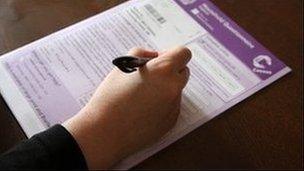Balance of power held by Northern Irish
- Published
- comments

The census story was eclipsed by the flag issue
In less tense circumstances, Tuesday's release of the 2011 census statistics would have been the big story of the week; not just a religious head count, but, given the inclusion of a new question on national identity, a mini border poll as well.
In the event, the continuing flag protests pushed the dry statistics down the running order.
However, without the different identities which they symbolise, the British and Irish flags would be nothing more than pieces of textile.
Since the census provided a unique insight into people's multi-layered identities, the protests and the statistics are intimately connected.
Most explanations of the Belfast union flag dispute have focussed on the manoeuvring by the city's councillors - how nationalists pushed for the flag's removal, unionists launched a leafleting campaign to put pressure on the Alliance, and Alliance stuck to its middle way of opting for designated days.
But another way to explain what's happened to the flag is to look at what the census says about the changing religious demography of the Belfast City Local Government District.
In 2001 Protestants made up 48.59% of Belfast's population, just ahead of Catholics at 47.19%.
Majority
Those following other religions or none made up 4.22%.
Fast forward to 2011 and Catholics are in the majority in Belfast at 48.58%, ahead of Protestants at 42.3%.
Those following other religions or none have risen to 9.12%.
Turn to the national identity findings and you find that in Belfast in 2011 35.07% thought of themselves as British only, ahead of 31.08% who described themselves as Irish, whilst a substantial 18.73% of Belfast citizens thought of themselves as Northern Irish.
Just as the cross-community Alliance holds the balance of power in Belfast City Council, across Northern Ireland as a whole those defining themselves as "Northern Irish" hold the balance, as explained elsewhere on this website.
It's wrong, however, to think these two groups are interchangeable - Omagh, a district with no Alliance councillors, has the highest percentage of people calling themselves "Northern Irish".
The DUP say the overall census findings on identity show the clear majority in Northern Ireland back the constitutional status quo.
Sinn Fein insists only a border poll can cut through the claim and counter-claim.
All parties would do well to spend some time pondering what those people who think of themselves as "Northern Irish" want.
Are parties wise to concentrate on their core "British only" or "Irish only" support, or do they need to find other ways to reach the 21% who appear to hold Northern Ireland's future in their hands?